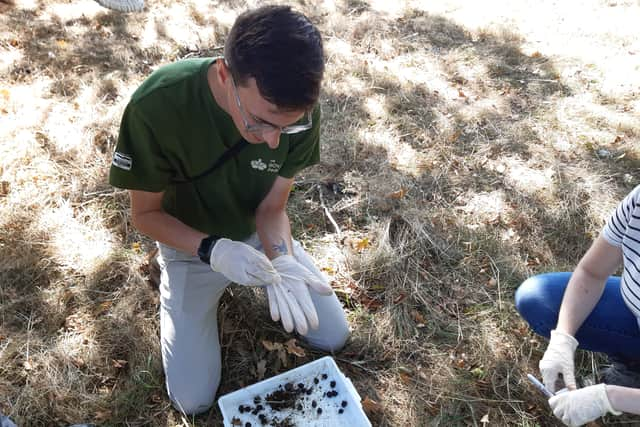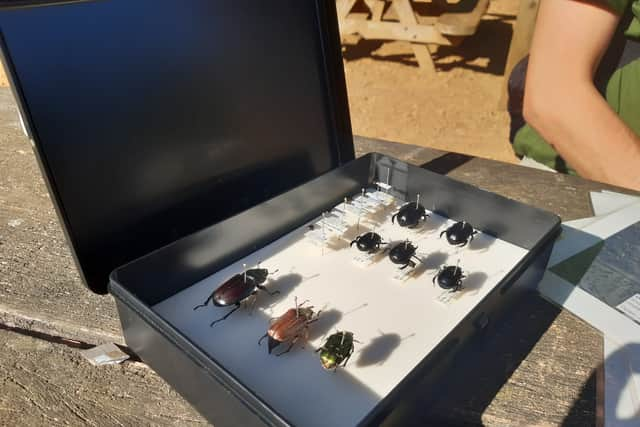Dung beetles are the UK's secret clean-up crew and unsung heroes - here's why we need to learn more about them
and live on Freeview channel 276
Unassuming piles of deer and horse dung in a leafy London park are likely to go unnoticed by families and dog walkers passing by.
But they hide some of the UK's most ecologically important - and secretive - insects, which despite their incredible value, are all too often overlooked.
Advertisement
Hide AdAdvertisement
Hide AdDung beetles are ecosystem architects, saving British farmers hundreds of millions of pounds each year by restoring pastures, while also cleaning up our parks and enriching the soils of important habitats.
But like much of the UK's wildlife, its dung beetles face a wide range of threats, with some of its 60-plus species believed to have disappeared altogether in recent years.
In London, the Royal Parks' Help Nature Thrive project has been carrying out dung beetle surveys in the Richmond upon Thames borough's Bushy Park since March, in a bid to better understand the elusive insects that call the thousand-acre park home.
NationalWorld's environment specialist Amber Allott joined staff and volunteers on a recent survey, to learn more about the UK's dung beetles, the threats they face, and just how special they really are.
Advertisement
Hide AdAdvertisement
Hide Ad'They're sort of unsung heroes'
Entomologist Connor Butler says they have learned a lot from the survey - even discovering species they did not know lived in the area - but there was still much more to learn about the underappreciated and deceptively important insects.
"Dung beetles are really important environmental indicators and they indicate the health of the ecosystem generally," he said. "The more species you have, the more healthy the ecosystem."
For a site of special scientific interest like Bushy Park - famed for its ecologically important acid grasslands - they performed an important service, Connor said.


"Dung beetles are really important recyclers of the animal waste we have here. We have around 300 deer in Bushy Park and all of that waste has got to go somewhere," he said. "Dung beetles do this free, amazing clean-up service for us by eating the dung - and they bury it underground."
Advertisement
Hide AdAdvertisement
Hide AdThis helps to aerate the soil, while also cleaning up all of the dung and improving the health of their grassland home.
"But it also, by breaking up the dung, quickly reduces the number of parasitic flies and other parasites we have in the park," Connor added. "So as a visitor, dung beetles are your friend, because that means there are less things that are going to bite you."
Their beneficial effects are mirrored across the UK, and just by going about their daily business, dung beetles help not just nature, but industry - particularly agriculture. It is estimated dung beetles save the cattle industry an estimated £367 million each year restoring pastures.
The shy beetles get little recognition for their efforts, Connor said, "yet they do this amazing service for us. I think they're sort of unsung heroes."
Advertisement
Hide AdAdvertisement
Hide AdMinotaur horns and 'amazing eyelashes'
Dung beetles in the UK are not very showy compared to some of their international cousins, Connor says.
"You don't see them rolling big balls of dung - they often live within the dung or they'll tunnel straight underneath it. So often you will never see them, because they're so secretive."
But this clandestine nature conceals a whole family of little creatures that are impressive in their own right.
"I think you get some really interesting ones," he said. "We have minotaur beetles at Bushy Park. They're quite big beetles that feed on rabbit dung, and the males have huge horns that they use to compete with other males.
Advertisement
Hide AdAdvertisement
Hide Ad

"You also get one that is a bright blue, cobalt colour, which is amazing... such a pretty insect lives in poo - you wouldn't expect such beautiful creatures to live in such a horrible setting."
That was a part of why he loved them, and why they had been an area of interest for him for the past seven years.
"If you can find interest in dung beetles and spend your days looking in dung, you're never going to be bored if you go for a walk - because there's generally poo everywhere," he added. "I find it quite satisfying finding these really beautiful beetles in such a disgusting setting.
"I think they're quite a special group of animals, and I recommend that everyone gets a pair of gloves on and goes for a walk and checks and dung," he said. There was a lot to learn and to love about them, including things you might not expect.
Advertisement
Hide AdAdvertisement
Hide Ad"Dung beetles have amazing eyelashes, which I think people would be quite jealous of if they saw them."
Wildlife under threat
There are more than 60 known species of dung beetle in the UK, but Connor says some are not doing as well as others. "We've had a few species go extinct recently, because dung beetles need a year-round supply of dung."
With agriculture becoming more intensified, animals are spending more of their time indoors, or in barns, he said. "That means there's not a continuous supply of animal dung outside, which means that they can't complete their lifecycle, and they'll go extinct from the area."
But he said there was another pressing issue for dung beetles, particularly those in parks - people unintentionally poisoning them. "If people give their dogs worming medication and then they leave that poo in the park, that also kills the dung beetles."
Advertisement
Hide AdAdvertisement
Hide AdCleaning up after your dog would be a big help, he said, but with more surveys coming up in October, people who want to aid in the effort to learn more about dung beetles - and aren't afraid to get their hands dirty - can volunteer.
"But also just appreciating them I think is important - they give us this amazing service for free," Connor said. "Go and have a look at them and appreciate them... because you can't protect a species unless you know that it exists."
Comment Guidelines
National World encourages reader discussion on our stories. User feedback, insights and back-and-forth exchanges add a rich layer of context to reporting. Please review our Community Guidelines before commenting.
